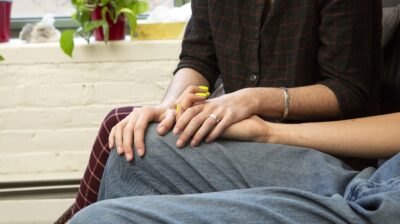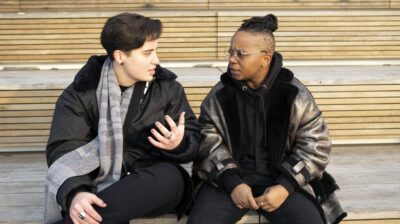TENI’s 19 ways to help gender dysphoria
The Transgender Equality Network Ireland (TENI) offers its advice on dealing with gender dysphoria


Gender dysphoria is the experience of distress or discomfort with your body’s sex characteristics or the gender role assigned to you. It’s something that is experienced differently by everyone and can change over time. There’s no one way to deal with dysphoria and different things work for different people. If you try something and you find that it doesn’t help, you can try different options until you find the right one for you.
TENI’s 19 ways to help deal with gender dysphoria
Here are some ideas that can help trans and gender diverse young people cope with dysphoria. Some are specific to gender dysphoria and some are more general coping strategies that may help. Try some out and make a list of ones that work for you. Remember, what works at one time may not be the same at another time, so trying out different strategies at different times can be useful too.
1. Express your feelings
Share your feelings in a notebook journal, or express how you feel through an art, craft or music project.
2. Talk to someone who understands
Talk to a supportive friend or find an online trans community you feel connection with. If you have a counsellor or therapist you feel safe talking with about your gender dysphoria, make time to bring this up with them. Join a support group, TENI have support groups for young people contact [email protected] for details. Join a LGBT+ or trans youth group, BelongTo can put you in touch with a youth groups in your area. Contact [email protected] for details.
3. Look for people with similar experiences
Listen to someone who has similar feelings to you – talk to friends who also experience dysphoria, or watch a Vlogger who you relate to.
4. Wear what makes you comfortable
Find/use items that help in expressing your gender and makes you feel more confident in yourself – binders, packers, STPs (stand-to-pee devices), breast forms, padded underwear, makeup, clothes, shoes, accessories, hair removal items, hair styling products.
5. Affirm your identity
Do small or big things that affirm your identity; whether it’s wearing a small accessory that is affirmative for you, re-styling your hair, or talking to your family, friends, teachers to tell them your name and pronouns.
6. Think about your future
Make plans, research, or take small steps towards your long-term social, medical and/or legal transition goals.
7. Find coping strategies
Find ways to do everyday things that reduce your dysphoria – steam up or cover the bathroom mirrors, wear a big hoodie or layers, use a big sponge or loofah for bathing, cuddle a pillow to cover your chest when you sleep, or master makeup contouring.
8. Practice self love
Tell yourself, out loud, that your body does not define your gender. Take a moment to point out a few positive things you love about your body more generally – things you are great at, or things you like about yourself. Remember to be easy on yourself and on your body image. Remind yourself of the diversity of all people’s bodies and gender presentations to give yourself a reality check.
9. Practice mindfulness
Practice breathing, meditation or other relaxation or mindfulness techniques.
10. Create a ‘coping care pack’
Try putting together a portable ‘coping care pack’ with your list of things that you can do to deal with dysphoria and any small supplies you need for the strategies that work for you. These can be things such as a distracting or sensory toy, an essential oil, lip balm, affirmation cards, a picture of your pet. That way you can have it available anytime.
11. Explore your identity
Take time to explore what feels right for you when it comes to your identity and expressing yourself and your gender. Forget beauty standards and gender stereotypes: what expressions and identities feel right for you?
12. Exercise
A healthy amount of exercise can improve your mood. Do what you like – dance your heart out in your bedroom, do some yoga, ride a bike, use the local park gym equipment, or look up exercises that will shape your body in ways that could reduce your dysphoria.
13. Be proud of yourself
Remember that your trials and struggles in life can make you stronger. You’ve made it to this point. You have a lot to be proud of.
14. Stimulate your senses
Smell something (perfume, a flower), taste something (something strong-flavoured or something you really like), listen to something (nature sounds or music), touch something (fabric, a furry pet, a teddy bear), stimulate your vision (by looking at a colour you like or pics of cute animals).
15. Make time for enjoyment
Listen to your favourite playlist, video game, or programme, or a long luxurious bath or shower. Go for a walk outside, watch the birds, trees or stars, care for an animal, paddle in a river, lake or the sea, sit in the sunshine.
16. Pamper yourself
Dress in your favourite gender-affirming clothes, or wear comfy clothes to help you relax/feel better, wear your favourite makeup, eat your favourite comfort food, get a haircut.
17. Find your rhythm
Take time out or stay busy – whichever works best for you at the time. Slow down and relax, or stay occupied and distracted.
18. Take care of yourself
You can prioritise your health and happiness in small ways daily. Getting a balanced, nutritious diet with lots of fruit and vegetables will help your mind and body feel its best. Avoid spaces or people that will bring you down. At the end of the night prepare to sleep by turning off devices, doing something relaxing, making the room quiet, clean and peaceful, and rest well.
19. Make time for pleasure
Make sure you are doing things that make you feel good everyday. Schedule it in if you have to.
Supports for gender dysphoria in Ireland
TENI
- Transformers is a peer support group for gender diverse young people of post primary school age. It can be beneficial to talk to other young people who are experiencing similar problems and can help you to feel less isolated. Contact [email protected] for more information.
BeLonGTo
Online LGBTI+ Youth Group for New Members
BeLonGTo’s online LGBTI+ youth group for new members is starting on Monday, January 11th 2021. This group is a safe space to meet people, chat, have fun, and learn a little about gender and sexuality. This online group is open to any LGBTI+ young person between 14-23 years. Learn more and sign up here.
Crisis Counselling with Pieta
Working with Pieta, BeLonGTo are providing a free crisis counselling service for LGBTI+ youth who are self-harming or thinking of suicide. Their therapist, Nash, is friendly and welcoming, and will listen to you in a safe, non-judgmental space and work through whatever is worrying you. Find out more here or make an appointment here.
Talk to their Youth Workers over Text, Phone or Email
Reach out and talk to BeLonGTo’s friendly, expert Youth Workers Shane, Kate and Sean in confidence about whatever is on your mind. They are happy to listen, provide you with information and referrals if needed. Click here to get in touch today.
Youth Groups Nationwide
BeLonGTo’s youth groups are safe spaces for LGBTI+ young people to meet, share experiences, and chat. Their groups are now being delivered virtually. Find your nearest LGBTI+ youth group here.
LGBT Ireland
- LGBT Helpline is available on 1890 929 539
- There is also a Family Support Line on 01 907 3707
- You can email [email protected] for support or information as face to face services are currently closed
50808
- Get anonymous support 24/7 with our text message support service
- Connect with a trained volunteer who will listen to you, and help you to move forward feeling better
- Free-text SPUNOUT to 50808 to begin
- Find out more about our text message support service
If you are a customer of the 48 network or cannot get through using the ‘50808’ short code please text HELLO to 0861800280 (standard message rates may apply). Some smaller networks do not support short codes like ‘50808’.
Bodywhys
- While all face to face and helpline services are currently suspended you can email [email protected] for information or support
- Bodywhys still have online support groups which are continuing as normal
- Visit bodywhys.ie for more information






